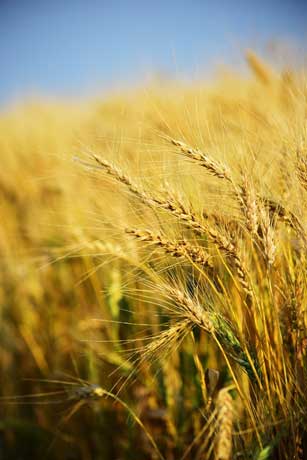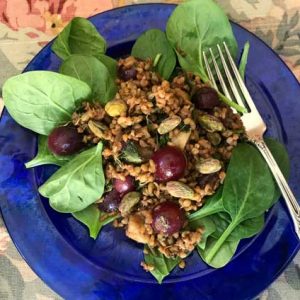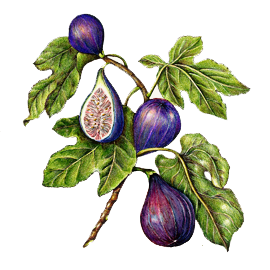Three Holidays, One Umoja Recipe
I had Chanukah in mind with this recipe, which I demoed yesterday at Temple Solel’s first-ever Jewish Vegetarian Food Festival, but it would be happy to be on anyone’s holiday table. With Chanukah, Christmas and Kwanzaa all clustered together in the same week, it’s an opportunity to celebrate our cultural and culinary traditions and to recognize how much we all have in common. In Swahili, the term is umoja.
African cuisine, Jewish cuisine, every cuisine, starts with place. Cuisine is where culture meets climate and imagination meets indigenous produce. In other words, take what’s local, seasonal, fresh and at hand — the produce, the herbs and spices, — and cook up something magical with it in the kitchen. Seasonal and local are how our ancestors ate. They had to. There was no running to the store when they were out of something, there was no Ubereats or Instacart.
One of our earliest lessons about seasonal, local foods comes from Deuteronomy, Chapter 8, Verse 7:
For Adonai your God is bringing you into a good land, a land with streams and springs and fountains issuing from plain and hill; a land of wheat and barley, of vines, figs, and pomegranates, a land of olive trees and honey.

Let’s click through the foods of that good land:
- barley
- wheat
- grapes (and with grapes come wine)
- olives (and olive oil)
- pomegranate
- figs
- honey (some Biblical scholars — and I — believe what’s really meant here is dates and date honey, or silan)
Barley feeds 5,000 people in the Book of John and has long been one of Africa’s major crops. But it’s also one of the seven sacred foods of Judaism. What we now call Sephardic cuisine began here, in the land Deuteronomy. Much of the cuisine of the Middle East and Mediterranean comprises these seven foods. Because that’s what they had.
And that’s what I prepared at Temple Solel’s Jewish Vegetarian Food Festival. To give people a taste of history and culture and place, I put together a significant salad combining those seven ancient sacred foods with just-picked fresh and local produce. Fresh and local, apart from being a good idea in general, has special resonance at Kwanzaa, which takes its name from first fruits of the harvest. So okay, it’s seven sacred foods plus two delicious, nutrient-dense friends.
Fruit is often used to add a note of sweetness in Sephardic cuisine, an idea they seized upon across the Mediterranean, especially at Christmas. The idea is not for this to be a fruit salad, though. The fresh greens, sprouts, whole grains, and pistachios provide the savory balance and the pomegranate molasses provides the sparkle and zing. That and a drizzle of olive oil is the only dressing. The ingredients themselves provide all the flavor and texture you need. It’s low in fat, but high in energy, mouth appeal and sex appeal that offers instant festivity whatever you’re celebrating..
Thanks to Temple Solel and to Fullei Fresh.

Seven Sacred Foods Salad
Ingredients
- 1/2 cup barley rinsed and drained
- 1/2 cup freekeh rinsed and drained
- 3 cups water or vegetable broth
- 2 tablespoons olive oil
- 3 dried figs chopped
- 3 dried Medjool dates chopped
- 2 dozen seedless red grapes halved
- sea salt and freshly ground pepper
- 2 tablespoons pomegranate molasses
- 4 cups assorted leafy greens and herbs chopped, such as arugula, parsley, mint, spinach, alfalfa sprouts, pea shoots, coriander, kale — choose what’s fresh and in season
- 1/3 cup pistachios chopped (optional)
Instructions
- Bring 1-1/2 cups of water or vegetable broth to boil in a medium saucepan. Pour in barley. Cover, reduce heat to low for 30 minutes, or until barley grains absorb all the liquid and are plump and tender. Set barley aside.
- Cook freekeh in the same manner, with the remaining 1-1/2 cups water or vegetable broth for 30 minutes, until the grains have plumped and absorbed all the liquid.
- If desired, let grains cool, then cover and refrigerate separately until you’re ready to assemble and eat. Allow barley and freekah to come to room temperature (or heat through at 350 degrees) before proceeding.
- Spoon grains into a large bowl. Drizzle in olive oil and mix in with a light hand. Add chopped figs, dates and grape halves.
- Season with sea salt and freshly ground pepper. Drizzle in pomegranate molasses and give another light mix to incorporate.
- Set aside at room temperature and allow ingredients to get to know each other for about 30 minutes.
- Just before serving, gently mix in, greens, keeping everything light. Taste again for salt and pepper. Garnish with chopped pistachios, if desired.

Leave a Reply